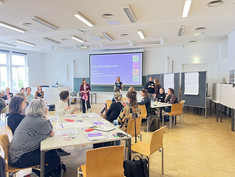Breaking the Soil Ceiling: Towards a Gender-Transformative CAP
In February 2025 the European Commission presented its vision for sustainable agriculture and food, which forms the basis for the next iteration of the Common Agricultural Policy (CAP). The focus of the vision lies on the urgently needed generational change in the agricultural sector.
This goal is to be achieved, among other issues, through the greater involvement of women and better protection of agricultural workers.
The agricultural sector in Europe is still male-dominated and characterized by social inequalities. This is largely due to persistent traditional gender norms that influence roles and identities on the farm as well as access to land, education and training. The GAP 2023–2027 has formally included gender equality among its objectives, but there are still no binding commitments for the Member States to implement this goal. Additionally, the CAP continues to take only a binary approach to gender (man / woman) disregarding other gender identities. In view of the CAP reform in 2028, there is an opportunity to shape a fairer and more gender-equitable agricultural policy.
On May 8, 2025, farmers, policy makers, civil society representatives and academics met at BOKU University to discuss gender equality in agriculture. The policy dialogue took place as part of the EU-Horizon-Project SWIFT (Supporting Women-led Innovations in Farming and rural Territories). The dialogue was organized by the Institute of Development Research at BOKU University, Vienna, in collaboration with OXFAM Belgium and Wageningen University. The aim of the policy dialogue was to discuss key challenges regarding gender equality in European farming, opportunities for change and concrete policy recommendations.
In total 24 participants from different institutions, among them national ministries, the Chamber of Agriculture, farming organizations such as the ÖBV (Österreichische Klein- und Bergbäuer_innen Vereinigung), national networks and civil society organizations took part in the dialogue. Similar policy dialogues were also held in Poland (March 2025) and Spain (April 2025). The insights of the three events will by synthesized to inform the concluding dialogue in Brussels this fall, where joint recommendations will be formulated.
Among the recommendations discussed during the Austrian policy dialogue were:
- Making small farms more viable: investment funding should be more accessible for small farms - for women as well as for men -, for example through result-oriented funding
- Holistic and more flexible approach to access funding
- Training structures need to change, include more women as trainees and in management position
- Fair distribution of care work
- Education opportunities specifically for women
- Increase permeability in agricultural schools which are traditionally gendered
- Gender quotas in representative functions
- The collection and reporting of gender-disaggregated data
Link to the final policy brief: https://swiftproject.eu/files/2025/06/250616_SWIFT-Policy-Dialogues-BRIEF-FINAL.pdf

